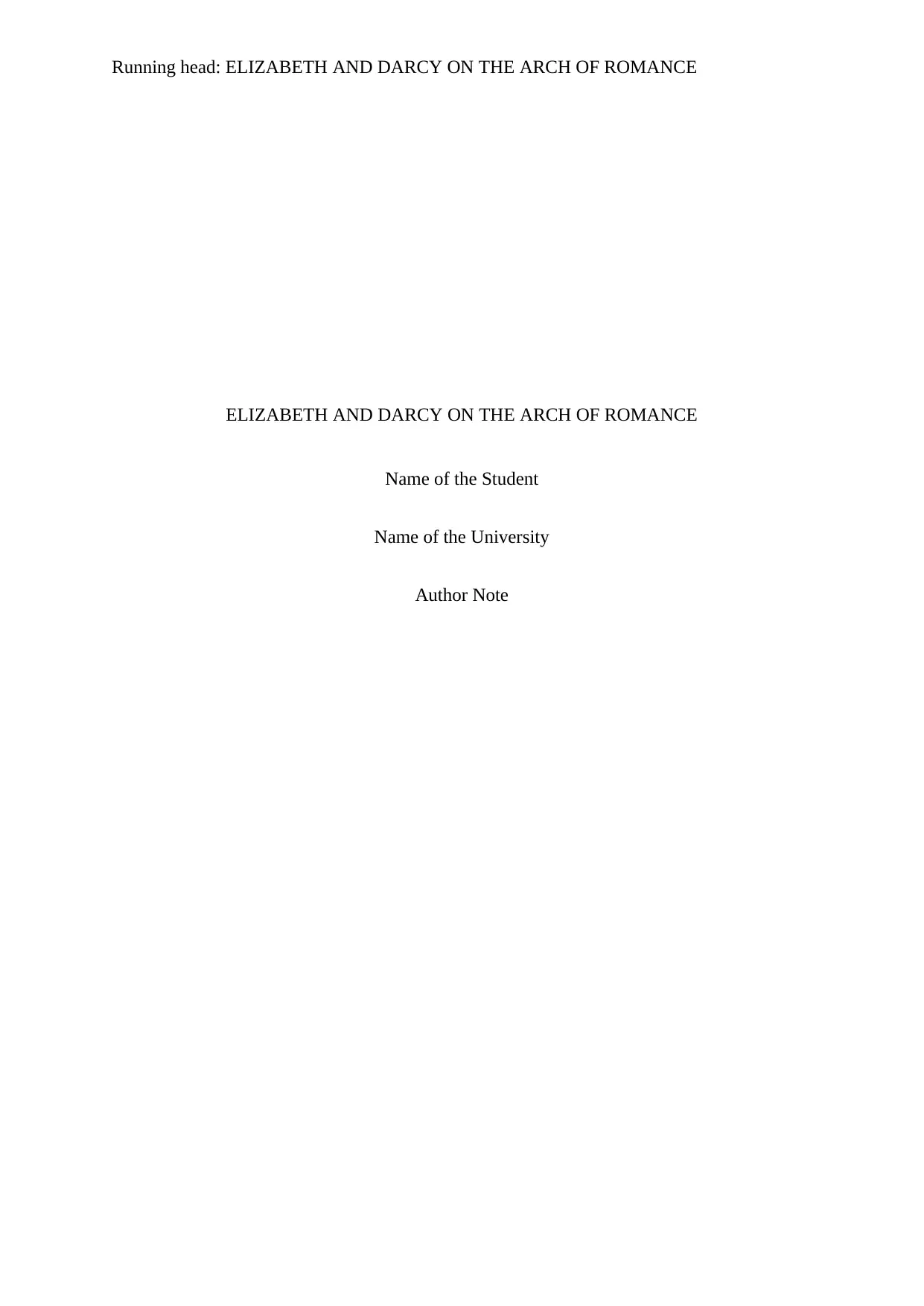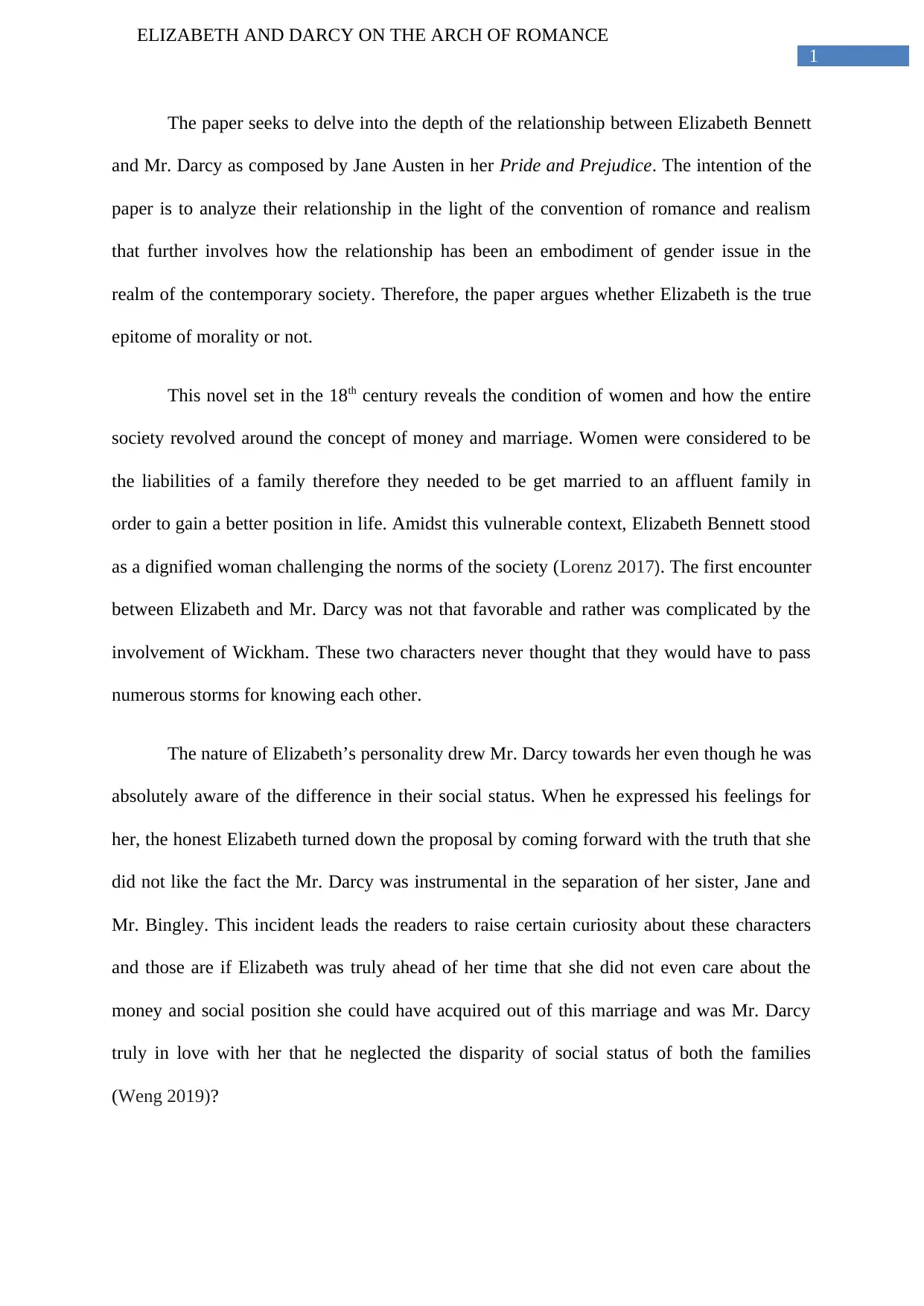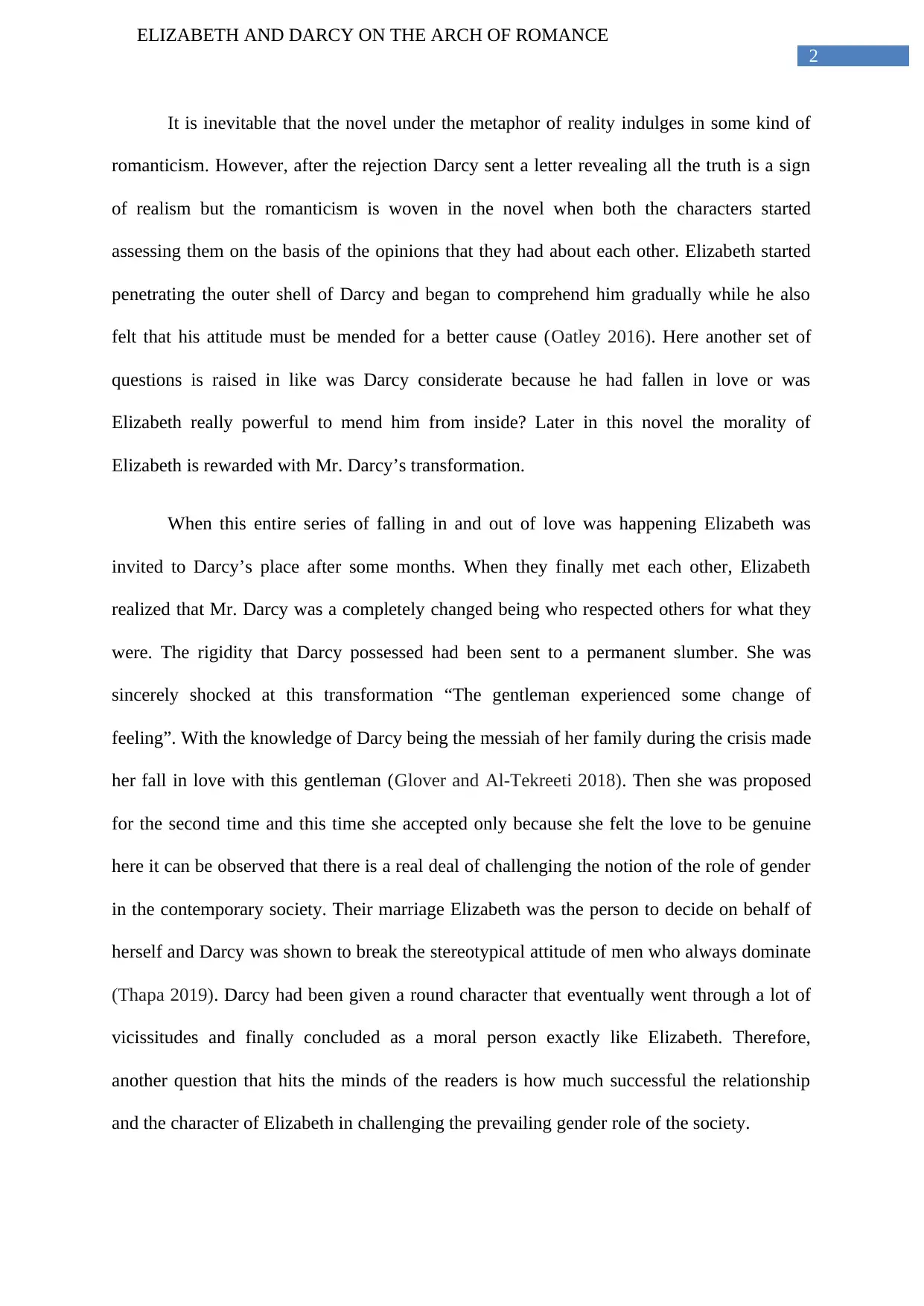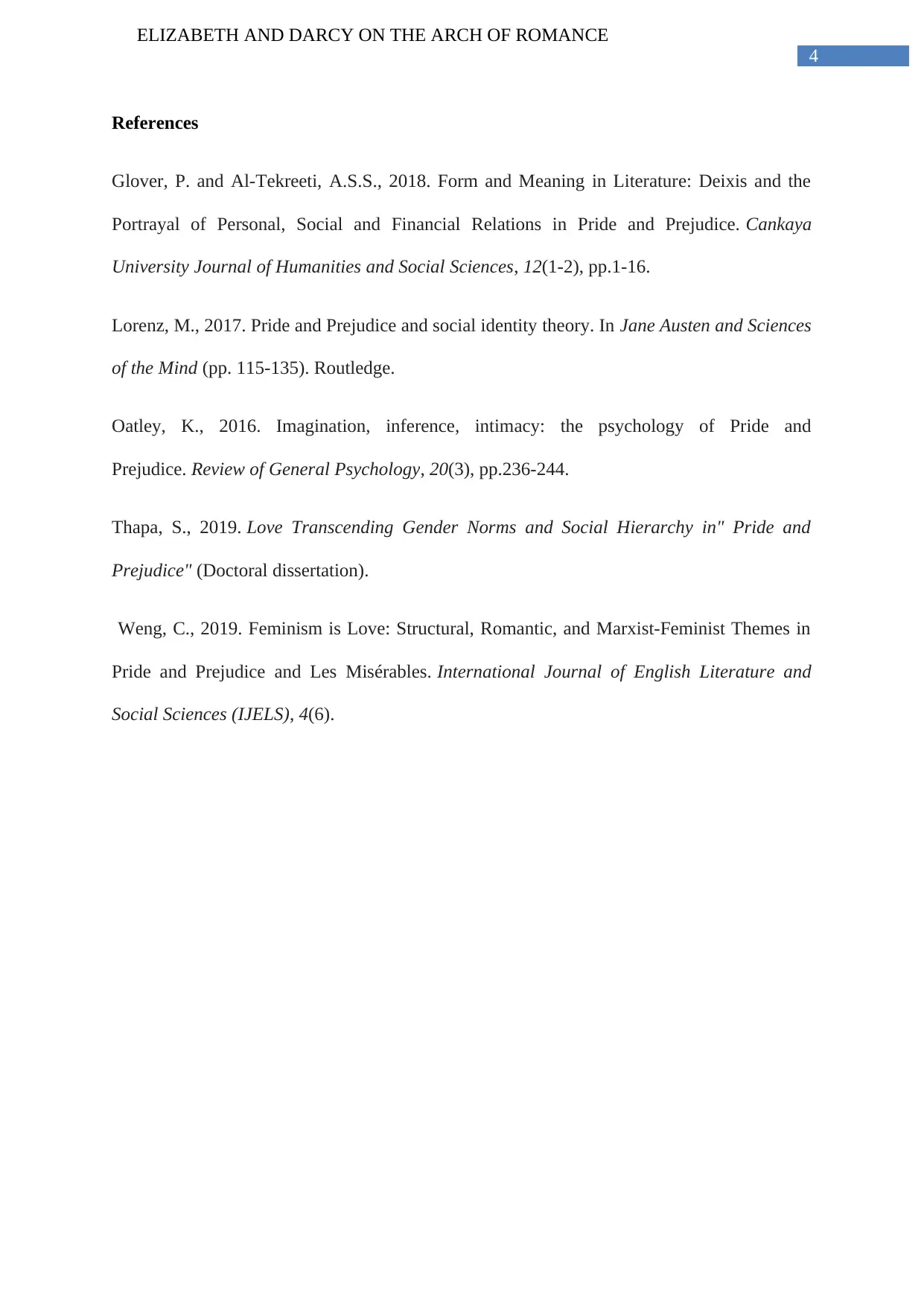Pride and Prejudice: Elizabeth and Darcy's Romance and Gender Roles
VerifiedAdded on 2022/09/11
|5
|1018
|11
Essay
AI Summary
This essay offers an in-depth analysis of the relationship between Elizabeth Bennet and Mr. Darcy in Jane Austen's Pride and Prejudice. It explores their dynamic in the context of romance and realism, examining how their interactions reflect and challenge societal norms, particularly regarding gender roles, prevalent in the 18th century. The paper investigates whether Elizabeth embodies morality, given the social constraints of the era, and how their initial misunderstandings and prejudices evolve into a deeper understanding and eventual love. The essay also considers the characters' transformations and the novel's commentary on money, marriage, and social status, culminating in a discussion of the success of their relationship in challenging prevailing gender roles. References to relevant literary analyses are included to support the arguments presented in the paper.

Running head: ELIZABETH AND DARCY ON THE ARCH OF ROMANCE
ELIZABETH AND DARCY ON THE ARCH OF ROMANCE
Name of the Student
Name of the University
Author Note
ELIZABETH AND DARCY ON THE ARCH OF ROMANCE
Name of the Student
Name of the University
Author Note
Paraphrase This Document
Need a fresh take? Get an instant paraphrase of this document with our AI Paraphraser

1
ELIZABETH AND DARCY ON THE ARCH OF ROMANCE
The paper seeks to delve into the depth of the relationship between Elizabeth Bennett
and Mr. Darcy as composed by Jane Austen in her Pride and Prejudice. The intention of the
paper is to analyze their relationship in the light of the convention of romance and realism
that further involves how the relationship has been an embodiment of gender issue in the
realm of the contemporary society. Therefore, the paper argues whether Elizabeth is the true
epitome of morality or not.
This novel set in the 18th century reveals the condition of women and how the entire
society revolved around the concept of money and marriage. Women were considered to be
the liabilities of a family therefore they needed to be get married to an affluent family in
order to gain a better position in life. Amidst this vulnerable context, Elizabeth Bennett stood
as a dignified woman challenging the norms of the society (Lorenz 2017). The first encounter
between Elizabeth and Mr. Darcy was not that favorable and rather was complicated by the
involvement of Wickham. These two characters never thought that they would have to pass
numerous storms for knowing each other.
The nature of Elizabeth’s personality drew Mr. Darcy towards her even though he was
absolutely aware of the difference in their social status. When he expressed his feelings for
her, the honest Elizabeth turned down the proposal by coming forward with the truth that she
did not like the fact the Mr. Darcy was instrumental in the separation of her sister, Jane and
Mr. Bingley. This incident leads the readers to raise certain curiosity about these characters
and those are if Elizabeth was truly ahead of her time that she did not even care about the
money and social position she could have acquired out of this marriage and was Mr. Darcy
truly in love with her that he neglected the disparity of social status of both the families
(Weng 2019)?
ELIZABETH AND DARCY ON THE ARCH OF ROMANCE
The paper seeks to delve into the depth of the relationship between Elizabeth Bennett
and Mr. Darcy as composed by Jane Austen in her Pride and Prejudice. The intention of the
paper is to analyze their relationship in the light of the convention of romance and realism
that further involves how the relationship has been an embodiment of gender issue in the
realm of the contemporary society. Therefore, the paper argues whether Elizabeth is the true
epitome of morality or not.
This novel set in the 18th century reveals the condition of women and how the entire
society revolved around the concept of money and marriage. Women were considered to be
the liabilities of a family therefore they needed to be get married to an affluent family in
order to gain a better position in life. Amidst this vulnerable context, Elizabeth Bennett stood
as a dignified woman challenging the norms of the society (Lorenz 2017). The first encounter
between Elizabeth and Mr. Darcy was not that favorable and rather was complicated by the
involvement of Wickham. These two characters never thought that they would have to pass
numerous storms for knowing each other.
The nature of Elizabeth’s personality drew Mr. Darcy towards her even though he was
absolutely aware of the difference in their social status. When he expressed his feelings for
her, the honest Elizabeth turned down the proposal by coming forward with the truth that she
did not like the fact the Mr. Darcy was instrumental in the separation of her sister, Jane and
Mr. Bingley. This incident leads the readers to raise certain curiosity about these characters
and those are if Elizabeth was truly ahead of her time that she did not even care about the
money and social position she could have acquired out of this marriage and was Mr. Darcy
truly in love with her that he neglected the disparity of social status of both the families
(Weng 2019)?

2
ELIZABETH AND DARCY ON THE ARCH OF ROMANCE
It is inevitable that the novel under the metaphor of reality indulges in some kind of
romanticism. However, after the rejection Darcy sent a letter revealing all the truth is a sign
of realism but the romanticism is woven in the novel when both the characters started
assessing them on the basis of the opinions that they had about each other. Elizabeth started
penetrating the outer shell of Darcy and began to comprehend him gradually while he also
felt that his attitude must be mended for a better cause (Oatley 2016). Here another set of
questions is raised in like was Darcy considerate because he had fallen in love or was
Elizabeth really powerful to mend him from inside? Later in this novel the morality of
Elizabeth is rewarded with Mr. Darcy’s transformation.
When this entire series of falling in and out of love was happening Elizabeth was
invited to Darcy’s place after some months. When they finally met each other, Elizabeth
realized that Mr. Darcy was a completely changed being who respected others for what they
were. The rigidity that Darcy possessed had been sent to a permanent slumber. She was
sincerely shocked at this transformation “The gentleman experienced some change of
feeling”. With the knowledge of Darcy being the messiah of her family during the crisis made
her fall in love with this gentleman (Glover and Al-Tekreeti 2018). Then she was proposed
for the second time and this time she accepted only because she felt the love to be genuine
here it can be observed that there is a real deal of challenging the notion of the role of gender
in the contemporary society. Their marriage Elizabeth was the person to decide on behalf of
herself and Darcy was shown to break the stereotypical attitude of men who always dominate
(Thapa 2019). Darcy had been given a round character that eventually went through a lot of
vicissitudes and finally concluded as a moral person exactly like Elizabeth. Therefore,
another question that hits the minds of the readers is how much successful the relationship
and the character of Elizabeth in challenging the prevailing gender role of the society.
ELIZABETH AND DARCY ON THE ARCH OF ROMANCE
It is inevitable that the novel under the metaphor of reality indulges in some kind of
romanticism. However, after the rejection Darcy sent a letter revealing all the truth is a sign
of realism but the romanticism is woven in the novel when both the characters started
assessing them on the basis of the opinions that they had about each other. Elizabeth started
penetrating the outer shell of Darcy and began to comprehend him gradually while he also
felt that his attitude must be mended for a better cause (Oatley 2016). Here another set of
questions is raised in like was Darcy considerate because he had fallen in love or was
Elizabeth really powerful to mend him from inside? Later in this novel the morality of
Elizabeth is rewarded with Mr. Darcy’s transformation.
When this entire series of falling in and out of love was happening Elizabeth was
invited to Darcy’s place after some months. When they finally met each other, Elizabeth
realized that Mr. Darcy was a completely changed being who respected others for what they
were. The rigidity that Darcy possessed had been sent to a permanent slumber. She was
sincerely shocked at this transformation “The gentleman experienced some change of
feeling”. With the knowledge of Darcy being the messiah of her family during the crisis made
her fall in love with this gentleman (Glover and Al-Tekreeti 2018). Then she was proposed
for the second time and this time she accepted only because she felt the love to be genuine
here it can be observed that there is a real deal of challenging the notion of the role of gender
in the contemporary society. Their marriage Elizabeth was the person to decide on behalf of
herself and Darcy was shown to break the stereotypical attitude of men who always dominate
(Thapa 2019). Darcy had been given a round character that eventually went through a lot of
vicissitudes and finally concluded as a moral person exactly like Elizabeth. Therefore,
another question that hits the minds of the readers is how much successful the relationship
and the character of Elizabeth in challenging the prevailing gender role of the society.
⊘ This is a preview!⊘
Do you want full access?
Subscribe today to unlock all pages.

Trusted by 1+ million students worldwide

3
ELIZABETH AND DARCY ON THE ARCH OF ROMANCE
Therefore it can be concluded that the paper has elaborated the ideas on how these
two characters were ahead of their time to protect their impression and dignity. However,
both of them were considerate and the paper has shown how beautifully their relationship
concluded happily specifically on moral and ethical ground. The paper has put questions
about the characters along with establishing the justification of the argument.
ELIZABETH AND DARCY ON THE ARCH OF ROMANCE
Therefore it can be concluded that the paper has elaborated the ideas on how these
two characters were ahead of their time to protect their impression and dignity. However,
both of them were considerate and the paper has shown how beautifully their relationship
concluded happily specifically on moral and ethical ground. The paper has put questions
about the characters along with establishing the justification of the argument.
Paraphrase This Document
Need a fresh take? Get an instant paraphrase of this document with our AI Paraphraser

4
ELIZABETH AND DARCY ON THE ARCH OF ROMANCE
References
Glover, P. and Al-Tekreeti, A.S.S., 2018. Form and Meaning in Literature: Deixis and the
Portrayal of Personal, Social and Financial Relations in Pride and Prejudice. Cankaya
University Journal of Humanities and Social Sciences, 12(1-2), pp.1-16.
Lorenz, M., 2017. Pride and Prejudice and social identity theory. In Jane Austen and Sciences
of the Mind (pp. 115-135). Routledge.
Oatley, K., 2016. Imagination, inference, intimacy: the psychology of Pride and
Prejudice. Review of General Psychology, 20(3), pp.236-244.
Thapa, S., 2019. Love Transcending Gender Norms and Social Hierarchy in" Pride and
Prejudice" (Doctoral dissertation).
Weng, C., 2019. Feminism is Love: Structural, Romantic, and Marxist-Feminist Themes in
Pride and Prejudice and Les Misérables. International Journal of English Literature and
Social Sciences (IJELS), 4(6).
ELIZABETH AND DARCY ON THE ARCH OF ROMANCE
References
Glover, P. and Al-Tekreeti, A.S.S., 2018. Form and Meaning in Literature: Deixis and the
Portrayal of Personal, Social and Financial Relations in Pride and Prejudice. Cankaya
University Journal of Humanities and Social Sciences, 12(1-2), pp.1-16.
Lorenz, M., 2017. Pride and Prejudice and social identity theory. In Jane Austen and Sciences
of the Mind (pp. 115-135). Routledge.
Oatley, K., 2016. Imagination, inference, intimacy: the psychology of Pride and
Prejudice. Review of General Psychology, 20(3), pp.236-244.
Thapa, S., 2019. Love Transcending Gender Norms and Social Hierarchy in" Pride and
Prejudice" (Doctoral dissertation).
Weng, C., 2019. Feminism is Love: Structural, Romantic, and Marxist-Feminist Themes in
Pride and Prejudice and Les Misérables. International Journal of English Literature and
Social Sciences (IJELS), 4(6).
1 out of 5
Related Documents
Your All-in-One AI-Powered Toolkit for Academic Success.
+13062052269
info@desklib.com
Available 24*7 on WhatsApp / Email
![[object Object]](/_next/static/media/star-bottom.7253800d.svg)
Unlock your academic potential
Copyright © 2020–2026 A2Z Services. All Rights Reserved. Developed and managed by ZUCOL.





